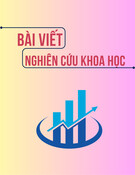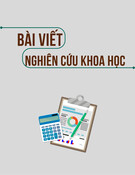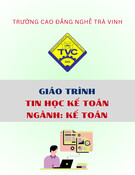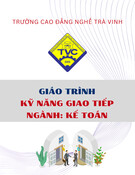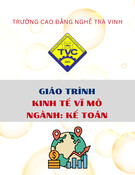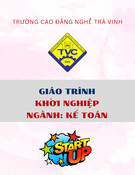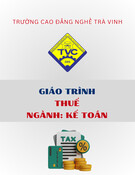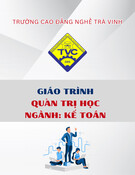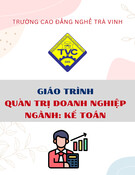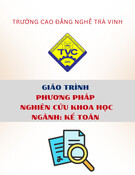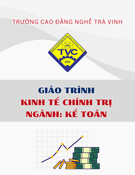
* Corresponding author
E-mail address: oanhletu@gmail.com (T.T.O. Le)
© 2020 by the authors; licensee Growing Science.
doi: 10.5267/j.uscm.2019.10.003
Uncertain Supply Chain Management 8 (2020) 403–422
Contents lists available at GrowingScience
Uncertain Supply Chain Management
home
p
a
g
e: www.Growin
g
Science.com/usc
m
Factors affecting the application of management accounting in Vietnamese enterprises
Thi Tu Oanh Lea*, Thi Ngoc Buia, Thi Thu Phong Tranb and Quoc Hung Nguyena
aUniversity of Labour and Social Affairs, Vietnam
bHanoi Open University, Vietnam
C H R O N I C L E A B S T R A C T
Article history:
Received August 28, 2019
Received in revised format
September 28, 2019
Accepted October 22 2019
Available online
Octobe
r
22 2019
This paper aims to investigate factors affecting the application of management accounting in
Vietnamese enterprises. Quantitative research was conducted and data was collected by
sending questionnaires to 120 companies in the manufacturing, trading and service sectors in
Vietnam. 6 factors were selected to measure the application of management accounting in
enterprises through correlation and regression analysis. The results showed that 5 out of 6
factors positively associated with the level of management accounting application; including
firm size, organizational culture, organizational structure, technology and human resources
operations. In particular, corporate culture has the highest impact and opinion of managers has
the lowest impact on management accounting application. Business environment has a
negative impact on management accounting application in enterprises. Based on the research
results, suggestions and recommendations are proposed for enterprises regarding application
of management accounting. The research provided an overview of management accounting
application and its benefits to enterprises. Whereby, it helps managers have a better
understanding of management accounting and future directions for application. Moreover, the
research results will be useful for managers to identify factors influencing their management
accounting practices and improve the current management process applied in organizations.
.Growin
g
Science, Canada s; license
by
the author 2020©
Keywords:
Factors
Management accounting
Management accounting
application
Vietnam enterprises
1. Introduction
Rapid changes in global business environment have driven enterprises to transform towards
sustainability by focusing on cost efficiency. Many studies have confirmed the benefits of management
accounting in improving business sustainability. However, most studies focus on business enterprises
since they play an important role in the economic growth in both developing and developed countries
(Mitchell & Reid, 2000). Globally, the number of business enterprises accounts for 99% of the total
organizations. In Vietnam, enterprises account for 97.3% of the total number of organizations and
contribute to 54% of the Gross Domestic Product (GDP), and create 87% of jobs for workers. In other
words, enterprises play a vital role in economic development in most countries. Therefore, business
enterprises have received substantial attention from researchers worldwide. In the globalization
context, enterprises are facing many challenges related to sustainable development, technological
progress, fierce market competition, changes in management and limitations of capital funding
(Nandan, 2010; Ahmad, 2012; Messner, 2016). According to Senftlechner and Hiebl (2015), in order
for enterprises to survive and maintain their sustainable development, both financial and non-financial

404
information should be taken into consideration. As a result, management accounting is considered an
effective management tool to support managers in performing management functions because it
combines and emphasizes both financial and non-financial information in the decision making process
of managers. In addition, management accounting provides various tools, techniques, and internal
information for budgeting, executive planning, performance evaluation and decision making.
Management accounting practices are not standardized due to a wide variety of business models in the
market as well as various application in each enterprise. In Vietnam, although management accounting
has been taught in universities since 1995, it has been applied in most Vietnamese enterprises
nowadays. However, application of management accounting in Vietnamese enterprises remains at a
relatively low level and low effectiveness (Anh, 2016; Hung, 2016). The fact is that enterprises
encounter many problems in management accounting application and mainly apply traditional
management techniques. Furthermore, the application of management accounting in Vietnamese
enterprises is influenced by many factors inside and outside the organizations, which may increase or
decrease the feasibility of management accounting application in Vietnamese enterprises. Therefore,
it is essential to identify and quantify the impact of each factor on the application of management
accounting in Vietnamese enterprises. The research objectives include:
- Identifying factors affecting management accounting application in Vietnamese enterprises;
- Evaluating the degree of impact of each factor on management accounting application;
- Proposing solutions to improve effectiveness of management accounting application in Vietnamese
enterprises.
2. Literature review
2.1 Review of international research on factors affecting management accounting application
Kordlouie and Hosseinpour (2018) conducted a study on 340 enterprises in Iran in which data was
collected through questionnaires and analyzed by structural equations. The management accounting
techniques applied includes activity-based costing, activity-based budgeting, industry analysis,
shareholder value analysis, product life cycle analysis and competitor analysis. The main influential
factors include organizational characteristics (including size, competitive strategy and management
decentralization), business potential (including customer power, advanced technology and market
competition), operational technology (including the complexity of processing systems, advanced
manufacturing technology and total quality management). Fasesin (2015) examined factors affecting
management accounting in enterprises in Nigeria. The study showed that traditional management
accounting techniques were widely applied in furniture manufacturing, food and beverage industry.
The main techniques of management accounting applied in companies in Nigeria include controlling
information through the use of current accounting data, comparing with data in the past, calculating
financial indicators, business analysis and responsibility accounting. Moreover, contemporary
management accounting techniques are also applied in listed companies. Particularly, techniques
applied by these companies include controlling the planning process and forecasting inventory,
customers, market shares, product life cycle. To investigate factors affecting management accounting
application, the author applied the research model of Kosaiyakanont (2011). The results showed that in
both types of management accounting methods (traditional and contemporary method), the influential
factors include managers, finance and company structure with the similar level of impact. Armitage
and Webb (2013) conducted a study on application of management accounting in Canadian companies
and found that enterprises use budgeting and variance analysis mainly for the planning purposes, and
do not focus on controlling function. Strategic management accounting tools such as quality costing,
target costing and just in time, activity-based costing or balanced scorecard are not applied. The success
of management accounting application in these companies depends on the qualifications of accountants
as well as knowledge and experiences of the managers. The study also pointed out other influential
factors such as financial capacity, company’s investment, market fluctuations and competitors, firm

T.T.O. Le et al. /Uncertain Supply Chain Management 8 (2020)
405
size. In particular, firm size has the highest impact (0.345), competitive market has the lowest and
negative impact (-0.125) on management accounting application. Michael et al. (2013), Abdel (2008),
Abdel (2004) examined the actual management accounting practices in manufacturing companies in
the UK. Abdel and Luther (2006) conducted a study on management accounting practices in the food
and beverage industry in the UK. The results indicated that management accounting application focuses
on controlling information rather than supporting decision making. The research proved that the
application of contemporary management accounting depends heavily on internal factors including
managers’ perspectives, accounting qualifications and financial capacity. External factors affect
management accounting application include legal environment, competition, risks, and technological
changes. Afirah (2018) carried out a study on management accounting application in 110 enterprises
in the East Coast of Malaysia. The study proved that 3 factors affecting management accounting
application include organizational characteristics, business potential and operational technology. Since
management accounting application in Malaysia is organizational-specific, contingency theory was
applied in this study. The research showed that small and medium-sized enterprises adopt the first 2 of
the 4 stages of management accounting application based on framework of Nishimura (2003). In
addition, the regression results showed that only operational technology has a positive impact on the
management accounting application (p-value = 0.005). The other two variables, namely, organizational
characteristics and business potential, had no significantly influence on the management accounting
application. These findings are inconsistent with the results of studies on large companies in Malaysia.
Ahmad (2012) investigated factors affecting management accounting application of Malaysian
enterprises and proved that influential factors include enterprise size, intensity of market competition;
participation of the owners in management accounting application and advanced manufacturing
technology. Particularly, participation of the owners in management accounting application has the
highest impact while advanced technology has the lowest impact. In addition, the research confirmed
advantages of management accounting in enhancing management effectiveness and efficiency,
increasing profits by reducing wastes and using of resources efficiently. Erserim (2012) conducted
research on the impact of internal and external factors on management accounting practices in
manufacturing companies in Turkey. Internal factors include firm size, organizational culture and
management. The study concluded that firm size has the highest impact on management accounting
practices and when a company expands its size (reflected by the number of employees), it requires a
more rigorous management through decentralization to achieve optimal efficiency. The research results
of Erserim was later applied and developed by Hiebl et al. (2013). The Hiebl’s study examined external
factors including investment environment, legal environment, cultural environment, social
environment, and integration tendencies of countries. In which, investment environment has the highest
impact on the process of application, contents and techniques of management accounting
Kosaiyakanont (2011) examined the relationship between perspectives and needs of business owners
regarding management accounting application in the North of Thailand. The study showed that the
greater the awareness of business owners on the importance and benefits of management accounting,
the higher the management accounting needs. Besides, there is a difference in awareness (knowledge)
about the importance and benefits of management accounting application between small enterprises
and medium-sized enterprises. Particularly, medium-sized enterprises have greater awareness of the
importance and benefits of management accounting as well as have higher management accounting
needs compared small enterprises. Nandan (2010) studied the management accounting needs in
enterprises. The study proved that management accounting information is very important for managers,
especially in the management of resources and making decisions on resource allocation. Commonly
used techniques include cost-volume-profit analysis, relevant information analysis, decisions making
under constraints. Furthermore, knowledge and experiences of managers and qualifications of
accountants have the highest impact on management accounting application. Abdel and Luther (2008)
conducted a study on management accounting practices in 658 food and beverage companies in the
UK. Influential factors examined in the study include perceived environmental uncertainty,
organizational structure, firm size, complexity of processing system, advanced manufacturing

406
technology, total quality management, just in time system, corporate strategy, customer power,
perishability level of products. The research results proved that:
There is a positive relationship between the level of perceived environmental uncertainty and the
level of sophistication of management accounting practices.
There is a positive relationship between customer power and the level of sophistication of
management accounting practices applied by enterprises. The reason is that when customers have
higher power, companies have to improve their controlling function and decision making process to
satisfy diverse customer needs;
There is a positive relationship between the level of decentralization and the level of sophistication
of management accounting practices;
There is a positive relationship between enterprise size and the level of sophistication of
management accounting practices;
Companies applying Advanced Manufacturing Technology (AMT), Total Quality Management
(TQM), Just in Time (JIT) system are more likely to adopt higher level of sophistication of
management accounting practices compared to companies which do not apply AMT, TQM, JIT.
Hyvönen (2007) conducted a research on the management accounting application in manufacturing
enterprises and provided empirical evidence on the wider extent of adoption of management accounting
practices as well as the perceived benefits from the application and potential development in the future.
The results proved that amount of capital, labor and market, cultural background and management
habits, advanced manufacturing technology, advanced machinery and equipment were determinants of
a success of management accounting application. Chenhall (2007) adopted contingency theory and
pointed out that the factors affecting management accounting practices in enterprises include
organizational characteristics (including size, competitive strategy and decentralization); business
potential (including customer power, technological advancement and market competition); operational
technology (including the complexity of processing systems, advanced manufacturing technology and
total quality management). This theory supports the idea that there is no universally appropriate
accounting system applied equally to all organizations in all circumstances (Otley, 1980). Xydias-Lobo
et al. (2004) summarized empirical studies conducted in Australia, the UK and The US and identified
the role of environmental factors and organizational factors. Specifically, environmental factors consist
of globalization of markets, advances in information and manufacturing technology, increased
competition. Organizational factors include core competencies, relationships with customers and
suppliers, downsizing, outsourcing, flatter organizational structures, team working. Lavia et al. (2015),
Laitinen (2003), Collis (2002) provided factors affecting changes in management accounting practices
including motivators (market competition, enterprise structure, production technology), catalysts
(financial inefficiency, a decline in market share, organizational changes), facilitators (accounting staff,
level of autonomy, accounting requirements). In particular, changes in business environment and
technology are considered a key factor affecting the changes of management accounting and strategic
structure of enterprises. In contrast, enterprise structure and strategy are linked with changes in
management accounting in the same context. Shields (1997) examined American enterprises and found
that potential factors leading to changes of management accounting include competition, technology,
enterprise structure and strategy. These factors have different impact on changes of management
accounting.
Amat et al. (1994) revealed a positive relationship between market competition on the use of
management accounting in small and medium-sized enterprises in Spain. The study indicated that
when intensity of competition in the market increases, there is also an increase in the use of
management accounting. The reason is that competition indirectly puts pressures on the enterprises to
acquire more information including both financial and non-financial information to ensure that they
remain competitive. Since all mentioned studies were conducted in the different study settings (in
terms of geographical region or industry), the findings might vary, however, it is consistent with the

T.T.O. Le et al. /Uncertain Supply Chain Management 8 (2020)
407
conception acknowledged by Messner (2016) who stated that the industry plays a vital role in
management accounting application in enterprises.
2.2 Review of studies on management accounting application in Vietnam
Yen (2017) carried out research on management accounting application on 90 enterprises in Binh Dinh
province. The results showed that management accounting application was influenced by three factors:
(i) perceived benefits of management accounting; (ii) qualifications of accounting staff; (iii) size of
enterprise. These factors were positively related to the success of management accounting application.
Anh (2016) examined more than 220 enterprises to understand the impact of management accounting
application on corporate performance in the transition economy in Vietnam. The study pointed out that
both decentralization and competition had positive impacts on the use of contemporary management
accounting techniques, but they had no impact on the use of traditional management accounting
techniques. In addition, the study provided that management accounting practices contributed to
improving the business performance. Hung (2016) conducted a survey on 186 enterprises and examined
7 factors affecting management accounting application in Vietnamese enterprises; namely enterprise
size, cost of management accounting application, organizational culture, qualifications of accountants,
corporate strategy, ownership structure, market competition, owner’s perspective. These factors
explained 34.8% of the impact on management accounting application in Vietnamese enterprises. The
most influential factors are owner’s perspective (19.16%), firm Size (18.67%) and corporate strategy
(18.19%). In summary, although each study was conducted in a different context, and in diverse
conditions of each country, management accounting practices are influenced by common factors
including firm size (capital, number of employees, market, turnover), business environment (intensity
of market competition, external environment, politics and laws), organizational culture (organizational
design, development strategy, participation of the owners, regulations, working processes,
organizational objectives), technology (advanced production technology, modern machinery and
equipment), Experiences and knowledge of managers. Besides, some specific factors are examined in
previous studies including financial capacity, requirement from outside, number of customers and
partners, globalization and integration, market share, changes (regarding organization, human
resources, technology). These studies applied qualitative and quantitative methods to investigate factors
influencing management accounting practices, however, they did not show the level of application as
well as management accounting techniques used in these enterprises. In addition, there has been not
much research on factors affecting management accounting application in Vietnamese enterprises
which applied a reliable quantitative method. Therefore, this study is conducted to fulfill the above
research gaps and provide empirical evidence on the matter.
3. Methodology
3.1. Measurement scales
The preliminary scales were established based on the research objectives and scales of previous studies.
Specifically, measurement scales were established based on prior research of Kordlouie and
Hosseinpour (2018), Afirah (2018), Afirah (2017), Hung (2017), Lavia et al. (2015), Ahmad (2012),
Abdel & Luther (2008), Chenhall (2007), Xydias-Lobo et al. (2004), Laitinen (2003) and Shields
(1997). Each previous study was analyzed in relation with specific characteristics of culture, society
and people of each country which are compared with characteristics of Vietnamese enterprises, socio-
political system, people and the level of economic development. It is concluded that the majority of
Vietnamese enterprises are small and medium-sized enterprises, with low management qualifications,
fierce competition of domestic market, developing stock market, the main type of enterprise is Limited
Liability Company. Based on that, six factors examined in this study are explained as follows:
Enterprise size: This is an important factor affecting the structure and controlling of enterprises. Based
on studies of Kordlouie and Hosseinpour (2018), Afirah (2018), Hung (2017), Armitage and Webb
(2013), Michael et al. (2013); Ahmad (2012); Chenhall (2007), Hutaibat (2005), Kader and Luther


